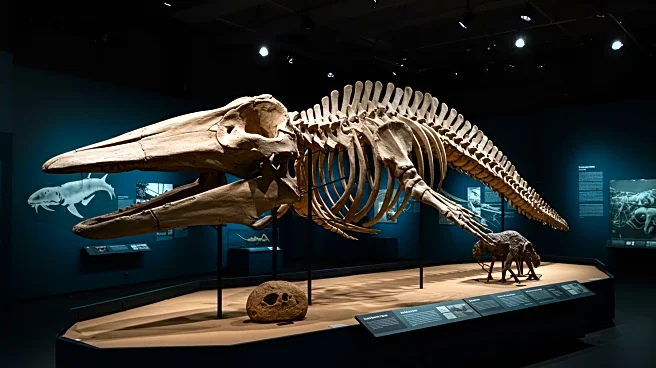What is the story about?
What's Happening?
Paleontologists have identified a new whale species from a 25-million-year-old fossil found on an Australian beach. The species, named Janjucetus dullardi, was discovered on Jan Juc Beach in Victoria, Australia. This prehistoric whale had distinctive features such as bulging eyes and razor-sharp teeth, making it a formidable predator despite its small size. The discovery was made by Ross Dullard, an amateur fossil hunter, who found the partial skull, including ear bones and teeth, in 2019. The species belongs to the mammalodontids, early whales that lived during the Oligocene Epoch, and is only the fourth species identified from this group. The find provides valuable insights into the evolution of whales, particularly how early cetaceans adapted to their environments.
Why It's Important?
The discovery of Janjucetus dullardi is significant for understanding whale evolution, particularly the transition from land to sea. This species represents an early branch leading to modern baleen whales, offering clues about the adaptations necessary for marine life. The research highlights the evolutionary changes in cetaceans, such as the development of powerful jaws and potential remnants of legs. These insights are crucial for understanding how ancient species adapted to warmer oceans, which can inform studies on how current marine life might respond to climate change. The discovery also underscores the importance of fossil-rich sites like Jan Juc Beach in revealing the history of marine life.
What's Next?
Further research is expected to focus on uncovering more fossils to provide a complete picture of Janjucetus dullardi's anatomy and behavior. Paleontologists aim to understand more about the species' ecological role and how it fits into the broader narrative of whale evolution. The discovery may lead to increased interest in fossil hunting at Jan Juc Beach, potentially revealing more about the diversity of prehistoric marine life. Additionally, the findings could contribute to ongoing studies on how ancient cetaceans adapted to environmental changes, offering insights into the resilience of marine species in the face of climate change.
















